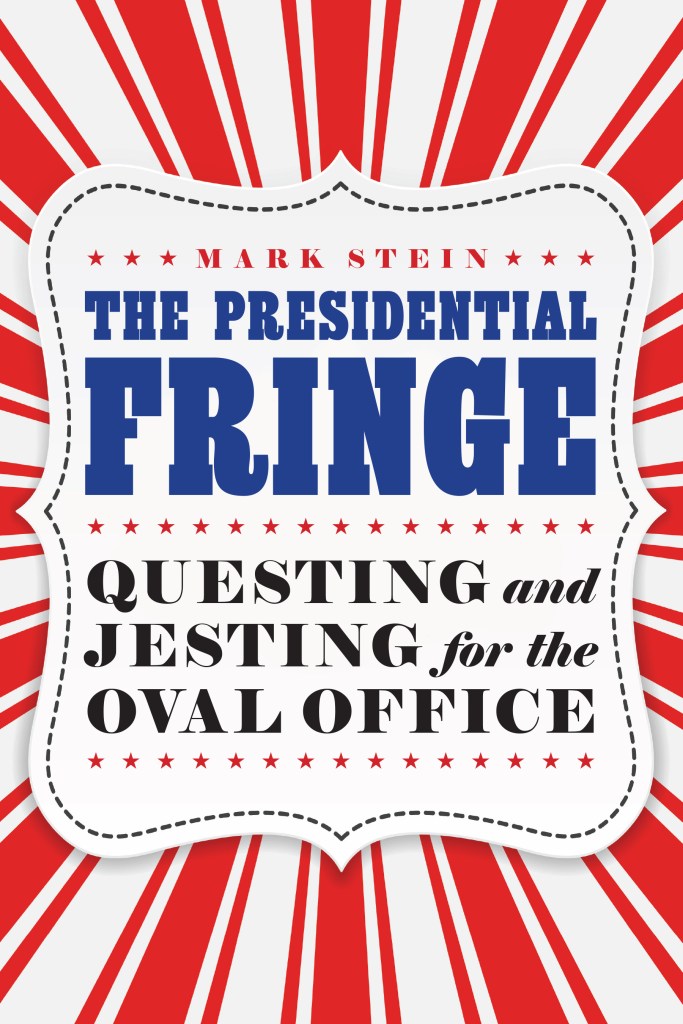Mark Stein is an author, screenwriter, and playwright. He is the author of several books, including The Presidential Fringe: Questing and Jesting for the Oval Office (Potomac Books, 2020) and How the States Got Their Shapes, a New York Times best seller and the basis for the eponymous History Channel series. For more information about the author, visit marksteinauthor.com.
On July 4th, Kanye West announced on Twitter that he had decided to run for president. His announcement was followed by more than a million “likes” in its first twenty-four hours. While “likes” are not votes, any presidential campaign that receives attention contains some element of significance, even when that attention is predominantly laughter—and even when, as with Kanye West, his campaign ends two weeks after it began.
Kanye West’s candidacy did trigger ridicule, ranging from online comments all the way up to an article in Forbes that quipped, “There are two types of people in this world: those who believe Kanye West is actually running for president, and those who know how album promotional cycles work.” Perspicacious perhaps and laugh if you wish. But laughter merely cloaks uncomfortable truths.
Clearly, Kanye West’s fame contributed to the attention his presidential announcement received. After all, as of that day, 1,122 others had registered with the Federal Election Commission as candidates for president.
But fame is not a prerequisite for such attention. During the 2008 presidential election, the less-than-famous professional wrestler, Jonathon “The Impaler” Sharkey, received a considerable amount of attention after he declared his candidacy for the presidency. Sharkey vowed to publicly impale Osama bin Laden where the Twin Towers had stood before the 9/11 attack that bin Laden had masterminded. Sharkey also vowed public impalement of President George W. Bush and declared he would win the war in Afghanistan by wiping out the entire country. The attention he received was, at its most respectful, thinly veiled ridicule. Nevertheless, eight years later, Donald Trump won the presidency in a campaign that included a vow to “take out the families of terrorists,” along with urging that competing candidate Hillary Clinton be locked up, and threatening the nuclear destruction of North Korea and Iran.
While Jonathon “The Impaler” Sharkey received few, if any, votes in 2008, neither did a famous fringe candidate in the 2012 election, Rosanne Barr. Like Sharkey, Barr’s free-wheeling rage-filled rants were the centerpiece of the attention she received, particularly for such issues as her vow to bring back “the Blessed and Holy guillotine.” So similar was Donald Trump’s 2016 free-wheeling rage-filled campaign style, that Barr complained, “He totally stole my act.”
Kanye West threatened to steal Donald Trump’s act. He too is known for free-wheeling, rage-filled rants. And, like Trump, he is a genuine superstar in his field. Where West has excelled as a music composer and performer, Trump excelled as a real estate developer and promoter. Both are also masterful branders—West’s brand extending into the world of fashion; Trump branding not only fashions but, over his longer years, extending his brand to such products as wine, steaks, and a urine test. Both are likewise masters at boasting. Where Trump has compared himself favorably to, among others, Abraham Lincoln, West has compared himself to Thomas Edison and Nelson Mandela.
Not surprisingly, their affinities have brought them together. Kanye West gained yet more attention as a supporter and friend of Donald Trump. Now however, West says he has become disenchanted with the man he is challenging in the current election. The fact remains, however, that while West may not still like Trump, he is still like Trump.
And therein the deeper significance to short-lived candidacy of Kanye West—along with the earlier candidacies of Roseanne Barr and Jonathon “the Impaler” Sharkey. Kanye West told an interviewer that he planned to run his administration along the lines of those in the nation of Wakanda. Wakanda is a fictional country, created by Marvel Comics for its Black Panther series. Similarly, professional wrestling is fictional fighting. While Roseanne Barr is a real person, her campaign made it difficult to distinguish if she was running as Roseanne Barr or as her fictional TV character from the series, Roseanne. Donald Trump, too, acquired much of his fame by starring for 14 seasons in The Apprentice.
Many have viewed these well-known facts with derision. But cloaked by that ridicule is an uncomfortable question which, in the wake of Donald Trump having won the presidency, is particularly significant:
To what extent are we living in a nation based on fiction?
As with any fringe candidate who receives widespread ridicule, hidden in the humor—and more important than the candidate—is a far larger question.

